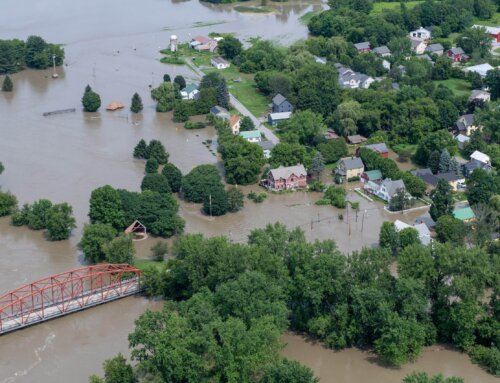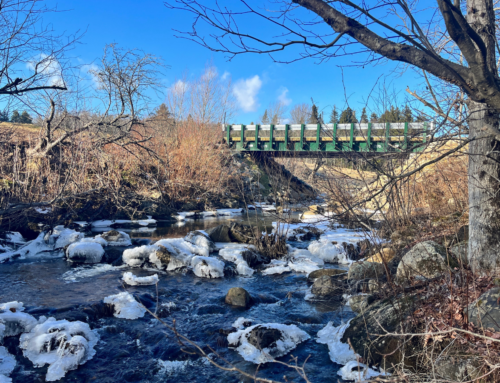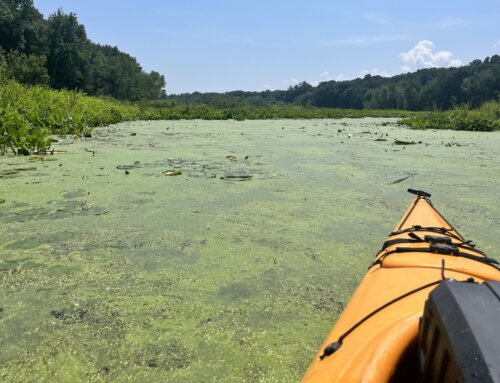Boaters Beware Exotics Lurk Everywhere!
“Exotic,” is usually thought to be an appealing word. When you hear it you can think of faraway places, different cultures, unusual and pleasing food unless of course you happen to be considering exotics from an ecological point of view. Exotic has a decidedly negative connotation to environmental scientists. From their point of view exotic can mean the loss of habitat for native species.
As we begin the boating season the Connecticut River Watershed Council is asking all boaters to help protect the Connecticut River from invasions of exotic plants and animals. Boaters, whether power boaters, canoers or sail enthusiasts, have a special responsibility in protecting the aquatic habitat of the Connecticut River Watershed. Being responsible is not a difficult task for boaters: just think: Drain, Inspect, Wash, and Dry!
For those who fish know where your bait came from, what species it is and whether or not it is a native species in the body of water where you are fishing. The introduction of the wrong species of baitfish into a water body can have devastating effects on the resident fish. Now we are faced with a potential invasion of Viral Hemorrhagic Septicemia, called VHS discovered just some 75 miles to the west of our watershed. VHS is an infectious virus that has the potential to kill fish by the thousands. The virus is spread by moving fish from one water body to another. Heed the restrictions on moving untested uncertified fish between water bodies.
When exotics establish themselves in a new environment they propagate more quickly than native species. Exotics are not faced with their usual predators and other habitat limits. In their uncontrolled explosions exotics deny native species their usual habitat killing off the native flora and fauna. They also create problems for humans, just ask anyone living on a waterbody where Eurasian milfoil or water chestnut has taken hold and choked their lake.
Last year we discovered the invasive algae Didymosphenia geminata, better known as didymo or rock snot in the Connecticut River. Didymo has the potential to spread rapidly, destroy river bottom habitat and make our watershed rather unappetizing to fish or swim in if it forms its usual thick mats on the bottom of our river. Fishers wearing felt bottom waders are the major risk of transporting this invasive to new water. Soak waders in hot soapy water or dry them out before going into new waters.
To date only prevention has proven to be successful in dealing with invasions of non-native species. Here in the Connecticut River watershed boats are the biggest threat to importing or spreading invasive species. Care in preventing further spread of these infestations is the only tool we have at our disposal. There are no “fixes” once milfoil, zebra mussels or other exotics are at hand.
These pests may be moved accidentally by anglers and recreational boaters trailering their boats from waterway to waterway. What should boaters be doing to protect the river?
It does not matter if the waterbody is known to harbor exotics. Act as though every place you launch contains these problem species and think: Drain, Inspect, Wash, and Dry!
Drain: Drain all bilge water, live wells; bait buckets, and any other water from your boat and equipment at the ramp as you leave a water body. Live bait should not be taken from water body to another. Do not dump live bait into the water; the bait may be a non-native species to that waterbody.
Inspect: At the ramp during both launching and trailering, thoroughly inspect your boat’s hull, drive unit, trim plates, trolling plates, prop guards, transducers, anchor and anchor rope, and trailer. Scrape off and trash any suspected mussels, however small. Remove all waterweeds hanging from boat or trailer.
Wash: Before launching your boat into uninfected waters, thoroughly flush the hull, drive unit, live wells and the pumping system, bilge, trailer, bait buckets, engine cooling water system, and other boat parts that got wet while in infested waters. Use a hard spray from a garden hose or tow the boat through a do-it-yourself carwash and use the high-pressure hot water. Do not use chlorine bleach or other environmentally unsound washing solutions next to the shore.
Dry: Boats and trailers should be allowed to dry thoroughly in the sun for up to 4 days before being launched into uninfected waters. Hot water pumped through an engine’s intake periodically is one method of preventing zebra mussel growth inside an engine’s cooling system.
CRC hopes boaters will be especially careful and protect our river from further invasions by exotics. Remember: Drain, Inspect, Wash, and Dry!
David L. Deen is the River Steward for the Connecticut River Watershed Council. CRC is celebrating over half a century as an articulate voice for the Connecticut River.
[/fusion_builder_column][/fusion_builder_row][/fusion_builder_container]






